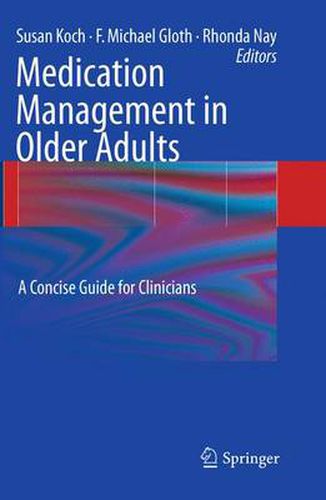Readings Newsletter
Become a Readings Member to make your shopping experience even easier.
Sign in or sign up for free!
You’re not far away from qualifying for FREE standard shipping within Australia
You’ve qualified for FREE standard shipping within Australia
The cart is loading…






This title is printed to order. This book may have been self-published. If so, we cannot guarantee the quality of the content. In the main most books will have gone through the editing process however some may not. We therefore suggest that you be aware of this before ordering this book. If in doubt check either the author or publisher’s details as we are unable to accept any returns unless they are faulty. Please contact us if you have any questions.
Medication use is the predominant form of health intervention in our society. And as we age, the likelihood of medication use increases dramatically, with more than 80 percent of those over age 65 using one or more medications. Along with that, the potential for medication errors also increases. Indeed adverse drug reactions (ADRs) and adverse drug events (ADEs) are a significant problem in older adults. Written in a practical format by contributors from Australia and the United States, Medication Management in Older Adults: A Concise Guide for Clinicians presents the available evidence on research interventions designed to reduce the incidence of medication errors in older adults, with a focus on acute, subacute, and residential (long-term) care settings. Because medication errors can occur at all stages in the medication process, from prescription by physicians to delivery of medication to the patient by nurses, and in any site in the health system, it is essential that interventions be targeted at all aspects of medication delivery.
Chapters cover the principles of medical ethics in relation to medication management; common medication errors in the acute care sector; medication management in long-term care settings; nutrition and medications; the outcomes of a systematic review; dose form alterations; Electronic Health Records (EHR), Computerized Order Entry (COE), Beers criteria; and pharmacokinetics and pharmacodynamics. For those clinicians especially concerned with providing the best possible outcomes for their older adult patients, Medication Management in Older Adults: A Concise Guide for Clinicians is an invaluable resource and a significant contribution to the burgeoning literature on medication errors.
$9.00 standard shipping within Australia
FREE standard shipping within Australia for orders over $100.00
Express & International shipping calculated at checkout
This title is printed to order. This book may have been self-published. If so, we cannot guarantee the quality of the content. In the main most books will have gone through the editing process however some may not. We therefore suggest that you be aware of this before ordering this book. If in doubt check either the author or publisher’s details as we are unable to accept any returns unless they are faulty. Please contact us if you have any questions.
Medication use is the predominant form of health intervention in our society. And as we age, the likelihood of medication use increases dramatically, with more than 80 percent of those over age 65 using one or more medications. Along with that, the potential for medication errors also increases. Indeed adverse drug reactions (ADRs) and adverse drug events (ADEs) are a significant problem in older adults. Written in a practical format by contributors from Australia and the United States, Medication Management in Older Adults: A Concise Guide for Clinicians presents the available evidence on research interventions designed to reduce the incidence of medication errors in older adults, with a focus on acute, subacute, and residential (long-term) care settings. Because medication errors can occur at all stages in the medication process, from prescription by physicians to delivery of medication to the patient by nurses, and in any site in the health system, it is essential that interventions be targeted at all aspects of medication delivery.
Chapters cover the principles of medical ethics in relation to medication management; common medication errors in the acute care sector; medication management in long-term care settings; nutrition and medications; the outcomes of a systematic review; dose form alterations; Electronic Health Records (EHR), Computerized Order Entry (COE), Beers criteria; and pharmacokinetics and pharmacodynamics. For those clinicians especially concerned with providing the best possible outcomes for their older adult patients, Medication Management in Older Adults: A Concise Guide for Clinicians is an invaluable resource and a significant contribution to the burgeoning literature on medication errors.